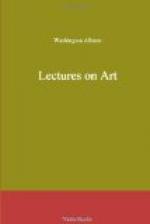With regard to the other class, that of Secondary Ideas, which we have called the reflex product of the mind, their distinguishing characteristic is, that they not only admit of a perfect realization, but also of outward manifestation, so as to be communicated to others. All works of imagination, so called, present examples of this. Hence they may also be termed imitative or imaginative. For, though they draw their assimilants from the actual world, and are likewise regulated by the unknown Power before mentioned, yet are they but the forms of what, as a whole, have no actual existence;—they are nevertheless true to the mind, and are made so by the same Power which affirms their possibility. This species of Truth we shall hereafter have occasion to distinguish as Poetic Truth.
Introductory Discourse.
Next to the developement of our moral nature, to have subordinated the senses to the mind is the highest triumph of the civilized state. Were it possible to embody the present complicated scheme of society, so as to bring it before us as a visible object, there is perhaps nothing in the world of sense that would so fill us with wonder; for what is there in nature that may not fall within its limits? and yet how small a portion of this stupendous fabric will be found to have any direct, much less exclusive, relation to the actual wants of the body! It might seem, indeed, to an unreflecting observer, that our physical necessities, which, truly estimated, are few and simple, have rather been increased than diminished by the civilized man. But this is not true; for, if a wider duty is imposed on the senses, it is only to minister to the increased demands of the imagination, which is now so mingled with our every-day concerns, even with our dress, houses, and furniture, that, except with the brutalized, the purely sensuous wants might almost be said to have become extinct: with the cultivated and refined, they are at least so modified as to be no longer prominent.




